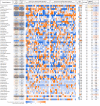Efficacy and safety of a food supplement with standardized menthol, limonene, and gingerol content in patients with irritable bowel syndrome: A double-blind, randomized, placebo-controlled trial
- PMID: 35704960
- PMCID: PMC9200470
- DOI: 10.1371/journal.pone.0263880
Efficacy and safety of a food supplement with standardized menthol, limonene, and gingerol content in patients with irritable bowel syndrome: A double-blind, randomized, placebo-controlled trial
Abstract
Background: Irritable bowel syndrome (IBS) affects 9,2% of the global population and places a considerable burden on healthcare systems. Most medications for treating IBS, including spasmolytics, laxatives, and antidiarrheals, have low efficacy. Effective and safe therapeutic treatments have yet to be developed for IBS.
Purpose: This study assessed the efficacy and safety of a food supplement containing standardized menthol, limonene, and gingerol in human participants with IBS or IBS/functional dyspepsia (FD).
Design: A double-blind, randomized, placebo-controlled trial.
Methods: We randomly assigned 56 patients with IBS or IBS/FD to an intervention group (Group 1) or control group (Group 2) that were given supplement or placebo, respectively, in addition to the standard treatment regimen for 30 d. Three outpatient visits were conducted during the study. Symptom severity was measured at each visit using a 7×7 questionnaire. Qualitative and quantitative composition of the intestinal microbiota were assessed at visits 1 and 3 based on 16S rRNA gene sequencing.
Results: At visit 1 (before treatment), the median total 7×7 questionnaire score was in the moderately ill range for both groups, with no difference between the groups (p = 0.1). At visit 2, the total 7×7 score decreased to mildly ill, with no difference between the groups (p = 0.4). At visit 3, the total score for group 1 indicated borderline illness and for group 2 remained indicated mild illness (p = 0.009). Even though we observed some variations in gut microbiota between the groups, we did not find any statistically significant changes.
Conclusion: The food supplement with standardized menthol, limonene, and gingerol content increased the efficacy of standard therapy in IBS and FD patients. The use of the supplement did not cause any obvious side effects.
Registration: ClinicalTrials.gov Identifier: NCT04484467.
Conflict of interest statement
The authors have declared that no competing interests exist.
Figures






References
Publication types
MeSH terms
Substances
Associated data
LinkOut - more resources
Full Text Sources
Medical

